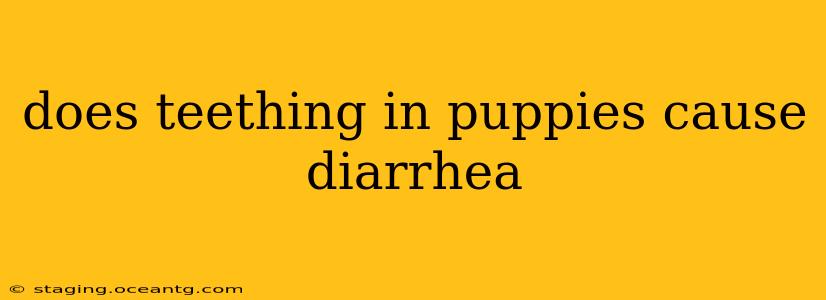Teething in puppies is a common and often messy process. While it doesn't directly cause diarrhea, it can indirectly contribute to digestive upset, leading to loose stools or even diarrhea in some cases. Let's explore the connection and what you can do.
How Teething Can Lead to Digestive Issues in Puppies
Teething puppies are notoriously prone to chewing on anything and everything they can get their tiny teeth on. This includes things that are far from ideal for their digestive systems. The link between teething and diarrhea isn't a direct causal relationship like a virus, but rather a consequence of their increased chewing behavior.
Here's the breakdown:
-
Ingestion of Non-Food Items: Puppies explore the world with their mouths. During teething, the discomfort in their gums drives them to chew even more intensely. This can lead to them ingesting things like:
- Carpet fibers: These can be irritating to the stomach and intestines.
- Socks or clothing: These can cause blockages or intestinal upset.
- Toys (especially if they're made of cheap, easily chewed material): Small pieces can be ingested, leading to blockages or digestive discomfort.
- Household items: From furniture scraps to toxic cleaning supplies, the possibilities are endless and dangerous.
-
Increased Stress and Anxiety: The pain and discomfort of teething can be stressful for a puppy. This stress can manifest physically in various ways, including changes in appetite and bowel movements.
-
Changes in Diet: Some puppies become more finicky eaters during teething. This can disrupt their digestive balance and lead to temporary digestive problems, including diarrhea.
What are the Symptoms of Teething-Related Diarrhea in Puppies?
It's crucial to distinguish between teething-related diarrhea and diarrhea caused by other issues. Teething-related diarrhea is usually:
- Mild and temporary: It typically resolves within a day or two once the puppy stops ingesting irritating objects.
- Associated with other teething signs: Look for swollen gums, excessive chewing, drooling, and potentially a decreased appetite.
- Not accompanied by other severe symptoms: Absence of vomiting, lethargy, or fever suggests the cause is likely teething-related.
However, if the diarrhea is severe, persistent (lasting more than a day or two), bloody, or accompanied by other symptoms like vomiting, lethargy, or fever, consult your veterinarian immediately. This could indicate a more serious underlying medical condition.
How Can I Prevent Teething-Related Diarrhea in My Puppy?
Prevention is key! Here's how you can minimize the risk of diarrhea during your puppy's teething phase:
- Puppy-proof your home: Securely store away anything that could be a choking hazard or cause digestive upset. This includes household cleaners, medications, small objects, and potentially harmful plants.
- Provide safe chewing toys: Offer a variety of appropriate chew toys specifically designed for puppies. Rotate toys regularly to maintain your puppy's interest. Frozen carrots or kongs filled with peanut butter can offer some soothing relief and chewing satisfaction.
- Monitor your puppy closely: Keep a watchful eye on your puppy's chewing habits. Interrupt any attempts to chew on inappropriate items and redirect their attention to suitable alternatives.
- Maintain a consistent diet: Avoid sudden changes to your puppy's food, which could upset their digestive system.
- Consult your veterinarian: If you have any concerns about your puppy's diarrhea, don't hesitate to contact your veterinarian for guidance.
Is it Normal for Puppies to Have Diarrhea While Teething?
While diarrhea isn't a normal part of teething, it's a relatively common complication. The frequency of teething-related diarrhea varies among puppies, depending on their chewing habits and what they ingest. Many puppies experience no digestive issues whatsoever, while others may have mild, temporary loose stools. The key is to monitor your puppy closely and seek veterinary attention if you're concerned.
When Should I Worry About My Puppy's Diarrhea?
You should contact your veterinarian immediately if your puppy's diarrhea is:
- Severe and persistent: Lasting longer than 24-48 hours.
- Bloody or contains mucus.
- Accompanied by vomiting, lethargy, fever, or loss of appetite.
- Your puppy shows signs of dehydration (sunken eyes, dry gums, lethargy).
Don't hesitate to seek professional help if you have any concerns about your puppy's health. Early intervention is crucial in preventing complications.
By being proactive and paying close attention to your puppy's health, you can help minimize the risk of teething-related diarrhea and ensure a smooth transition through this developmental stage. Remember, your veterinarian is always the best resource for any health concerns your puppy may have.
